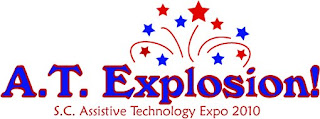
Welcome to the Center for Disability Resources Library Blog! Here we will welcome your comments and suggestions about books and videos that you have borrowed, materials that you would like to see purchased, or anything involving the day-to-day operations of the library or even of disabilities in general. Visit the CDR Library's web site!
Thursday, March 11, 2010
Mouse Model Reveals a Cause of ADHD

Wednesday, March 10, 2010
A Playground for All Children of Aiken County, South Carolina
 A Playground for All Children of Aiken County, South Carolina
A Playground for All Children of Aiken County, South Carolina"All Play Every Day" is a project of the Leadership Aiken County Class of 2009-2010. The intent of this project is to the raise funds that will be used to build a barrier-free playground for all children, including those with Special Needs. We are working to arrange that this playground be centrally located for Aiken County Residents and will facilitate an environment where all children can play together regardless of their abilities or disabilities.
This playground would provide rehabilitation and recreation to foster the development of all children in our county, including those with visual and hearing impairments or dependency on crutches and wheelchairs. Sadly, there is currently not a public boundary free (handicap-accessible) playground in all of Aiken County. The closest playground that offers this level of accessibility is in Augusta, GA. The reality is that many Aiken County families do not have the time or resources to frequent that playground. With your help, we can make this a reality!
The LAC class project will include the development of an awareness campaign through the use of this website, flyers, media coverage, and an awareness activity day at a community park. Our fundraising efforts will include pursuing grants, a corporate sponsorship campaign, name recognition with brick donors, recognition of significant donors within the park environment, and the hosting of a Bocce tournament on April 17th. Our goal is to raise $50,000 towards the cost of the playground surfacing and equipment under Leadership Aiken County’s 501(c)(3) non-profit status.
The next fundraiser is Bocce Tournament at Aiken’s Whitney Polo Field, Mead Avenue, Aiken, on Saturday, April 17, 2010 from 10 am to 2 pm.
See http://www.aikenplayground.org/ for more information. Email the Leadership class at contact@aikenplayground.org.
Regular Analgesic Use Increases Hearing Loss in Men, Study Finds

Tuesday, March 09, 2010
March 2010 Newsletter
 This past month has been quite productive - we had over 100 information requests and even more articles sent out to patrons! We added several new patrons and checked out almost thirty books this month as well. Notable book additions includ The Horse Boy, How it Feels to Live With a Mental Disability, and Anna's Silent World.
This past month has been quite productive - we had over 100 information requests and even more articles sent out to patrons! We added several new patrons and checked out almost thirty books this month as well. Notable book additions includ The Horse Boy, How it Feels to Live With a Mental Disability, and Anna's Silent World.The newletter may be viewed by clicking the link in this post's title.
Webinar: Communicating With Your Child's School
 Meeting Description:
Meeting Description:- Talking with your child's IEP team
- Communicating with your child's school through letterwriting
- Organizing information about your child
- Problem-solving skills
- Are you passive or assertive?
- Tips to assist parents to understand their parental rights
Brain Injury Alliance of SC Run for Thought!
 March is Brain Injury Awareness Month!
March is Brain Injury Awareness Month!Please join us for the Brain Injury Alliance of SC Run for Thought!
The Event is presented by Roger C. Peace Rehabilitation Hospital. Among other things, this event also enables provision of a Statewide conference that provides information about assistive technology funding and implementation.
What: 5K Road Race, 1 Mile Walk and Roll
Where: Furman University, Greenville, SC
When: Saturday, March 13, 2010
Registration at 8:30 a.m. and Race/Walk begin at 9:30 a.m.
Register at www.FirstGiving.com/BIASC or contact BIASC office for registration form.
If you have any questions, please contact BIASC office at 1-877-TBI-FACT! Thanks!
Word Learning Better in Deaf Children Who Receive Cochlear Implants by Age 13 Months

Monday, March 08, 2010
Key Player Found for a Cancer Typical in Down Syndrome

Friday, March 05, 2010
SC AT Expo 2010!
 South Carolina Assistive Technology Expo 2010
South Carolina Assistive Technology Expo 2010Thursday, March 18, 2010 9 am – 4 pm
New Ways to Diagnose and Treat Alzheimer's, Findings Suggest

Thursday, March 04, 2010
Please help spread the word: Preparing Students for the Real World: A Full Day Workshop

Preparing Students for the Real World: A Full Day Workshop on Transition
Transition can be a very exciting, and yet very stressful time for parents and professionals who are preparing adolescents with autism and other developmental disabilities for an exit from the school system, and entrance into “the real world.” This workshop will overview the three major components of transition planning: postsecondary education, employment, and community living. Within each area, participants will learn to use a “one person at a time” approach to transition planning, and utilize assessment tools and strategies to support students with disabilities and their families in weighing out available options and identifying an appropriate path to adulthood.
Register for this workshop.
Instructor:
Darlene Magito-McLaughlin, Ph.D.
March 25, 20109:00 am-4:00 pm (registration begins at 8amLunch is included in workshop fee. Workshop Fee: $75 BACB CEU fee (optional): $20
Cancellation policy applies.
Location: MAP Columbia Conference Center169 Laurelhurst Ave.Columbia, SC
This workshop is designed for special education teachers, job coaches, board certified behavior analysts, board certified associate behavior analysts, and other professionals who are involved in transition planning for youngsters with autism and other developmental disabilities.
This workshop is Behavior Analyst Certification Board (BACB) approved for 6 hours of Continuing Education Credit for qualified participants.
OBJECTIVES:
As a function of attending this workshop, attendees will be able to:
Use a “one person at a time” approach to transition planning, based on the principles and procedures of positive behavioral support and person-centered planning.
Identify and use available assessment tools and strategies to support students with disabilities and their families in weighing out available options regarding transition
Identify the continuum of services available in the areas of postsecondary education, employment, and community living.
Identify essential skills that will allow students to plan for and access the least restrictive alternatives in each area.
Create a collaborative partnership with families, schools, communities, and other professionals in order to divide and share responsibility for transition, thereby maximizing the likelihood of a successful outcome.
Assist families in using technology to access information, networking, financial, and personnel resources relevant to transition.
Darlene Magito McLaughlin, Ph.D. is the Founding Director and President of Positive Behavior Support Consulting and Psychological Resources, P.C., a professional consortium dedicated to the resolution of problem behavior in children, adolescents, and adults with special needs. She is a Clinical Psychologist who has worked in the field of developmental disabilities for over 23 years in a variety of different capacities that have included direct care, behavioral consultation, agency administration, school inclusion, and transition consultation. Dr. Magito McLaughlin received her Bachelor’s degree in Psychology from Adelphi University in 1987, and a Master’s degree in Applied Psychology with a specialty in Applied Behavior Analysis from Adelphi in 1988. She later received a Master’s in Psychology from the State University of New York at Stony Brook in 1995, and a Ph.D. in Clinical Psychology from Stony Brook in 1999, under the mentorship of Dr. Edward G. Carr.
Dr. Magito McLaughlin has published several empirical papers and book chapters on positive behavioral support strategies for children, adolescents, and adults with severe problem behavior. She has spoken nationally and internationally on topics related to behavioral support, and her work has been translated into in three languages. Dr. Magito McLaughlin’s clinical and research interests continue to promote normalization and inclusion for people with the most severe disabilities. In addition, her work has stressed individualized planning, strengths-based assessment, and the prevention of problem behavior through skill-building and environmental modification, multicomponent treatments, relationship-building, and broad systems change.
Dr. Magito McLaughlin and her colleagues work with families and school districts throughout Long Island to assist students in learning the skills necessary to find meaningful work and recreation in their home communities, to network and gain the respect of their peers, and to achieve important quality of life outcomes that will bridge the school to life transition in the least restrictive way possible.
Tim Conroy
Vice President and Chief Operating Officer
South Carolina Autism Society
806 12th Street
West Columbia , South Carolina 29169
803-750-6988 extension 101
tim@scautism.org
Tuesday, March 02, 2010
The SC Adult Sibling Leadership Network
 What is the purpose of the Adult Sibling Leadership Network?
What is the purpose of the Adult Sibling Leadership Network?Provide opportunities for adult siblings of persons with developmental disabilities, related disabilities, and brain and/or spinal cord injuries to:
· Network with each other;
· Share experiences, ideas, and concerns;
· Gain information about the state’s system of supports and services; and
· Receive training on how to effectively advocate on behalf of their brother or sister with a disability.
Who is the Sibling Network For?
· Adult siblings, 21 years of age or older, of persons with developmental disabilities, related disabilities, and brain and/or spinal cord injuries.
· Anyone else that the individual with a disability considers family in cases where there is no living sibling.
What are the benefits of joining the Adult Sibling Network?
· Monthly webinars/seminars on topics of interest to siblings
· Statewide conference
· Adult Sibling Newsletter
· Adult Sibling Directory
· Support group
· Website with links to other states’ Adult Sibling Networks, other SC agencies and partners serving adults with disabilities, and legislative database.
What are the costs for joining the Adult Sibling Leadership Network?
· There is NO financial cost for joining the network. There may be some registration fees associated with attending a statewide conference.
How can I join the Adult Sibling Leadership Network?
Complete a membership form or apply on-line on PRO-Parents’ website (www.proparents.org ) so we can address your interests and needs.
The SC Adult Sibling Leadership Network is a project of PRO-Parents of SC and is funded through a grant from the SC Developmental Disabilities Council. The grant will provide opportunities for adult siblings of persons with disabilities to network with each other, share information, gain information, and receive training on how to effectively advocate on behalf of their brother or sister. There is no obligation or cost to join the SC Adult Sibling Leadership Network. For more information or to receive a membership application, please contact PRO-Parents at (803) 772-5688 or 1-800-759-4776, or go to our website at www.scadultsiblingnetwork.org
Monday, March 01, 2010
Naptime Helps Babies Remember New Things
 WEDNESDAY, Feb. 24 (HealthDay News) -- Naps play an important role in infant learning by helping children's developing brains retain information, a new study has found.
WEDNESDAY, Feb. 24 (HealthDay News) -- Naps play an important role in infant learning by helping children's developing brains retain information, a new study has found.Researchers at the University of Arizona in Tucson found that infants who have daytime naps are more likely to exhibit an advanced level of learning called abstraction -- the ability to detect a general pattern contained in new information.
The full article may be viewed by clicking the link in this post's title.